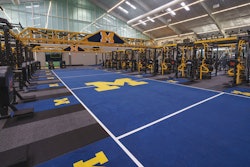Budget-conscious rec departments are buying in to an upward trend in environmentally friendly purchasing.
 Photo of a shopping bag with the recycle logo printed on the front
Photo of a shopping bag with the recycle logo printed on the frontThese days in the public sector, when considering the impact of a given purchasing decision, the phrase that comes to mind is "bottom line." But there are other impacts - environmental, for one. And those responsible for procurement for government agencies of all sorts are beginning to recognize that certain purchasing policies can work to achieve friendliness toward both the environment and the budget. Such recognition is especially important within parks and recreation departments, as they are major municipal spenders while also serving as champions of environmental stewardship and sustainability.
In April through July of last year, the Ottawa, Ont.-based consultancy TerraChoice Environmental Marketing Inc. interviewed procurement experts about their perceptions of "green purchasing" trends and the North American economy for the company's 2009 EcoMarkets study. Considering that the respondents - nearly 40 percent of whom held government titles - were and are struggling to survive the most significant global economic downturn in decades, the results of the study were somewhat surprising.
More than half (56 percent) of respondents said they did more green purchasing in the previous 12 months than ever before, and 83 percent predicted an additional uptick in green purchasing over the next two years. Even among those respondents who "acknowledged" a recession in North America, nearly 80 percent said their organizations will continue to expand their green purchasing plans within the next one or two years, and 76 percent of those surveyed said the Obama administration was having a positive effect on green purchasing. Such results, according to TerraChoice CEO Scott McDougal, defy what he calls the "conventional wisdom that green concerns go away in tighter economic times."
The implementation of a given municipality's green purchasing practices begins with a green purchasing policy. Of the 580 people interviewed in the TerraChoice study, approximately 72 percent said their organization has instituted some form of green purchasing policy, up from 63 percent the previous year. Naturally, any procurement policy that spans an entire organization is going to affect its various branches, which is why recreation administrators are best served to be directly involved from the outset of policy-making.
Through input from the parks and recreation department, Mecklenburg County, N.C., was able to include in its 31-page "Purchasing Guide for Environmentally Friendly Products" an entire section dedicated to purchasing specific to parks and recreation. With subsections labeled "Playground Systems and Components," "Site Furnishings" and "Surfacing Materials," the policy dictates a range of requirements, such as that new equipment should be composed of a minimum of 20 percent recycled content (50 percent for playground surfacing), and it outlines both positive and negative potential environmental impacts of commonly used park products. The purchasing guide reflects the countywide "Environmental Leadership Policy" and asks all employees to consider the following questions when making any purchase:
- Is the product less hazardous?
- Is it reusable or more durable?
- Is it made from recycled materials?
- What happens at the end of its life? Can it be recycled? Will the manufacturer take it back? Will it need special disposal?
- Does it conserve energy or water?
- Is it made from plant-based raw materials?
Michael Kirschman, the county's division director for nature preserves and natural resources, says many people within the parks and recreation department likely considered these and other environmental questions well before any written guides or policies were adopted. "The culture at Parks and Recreation has always been a green one," he says. "Many of the things in the policy we had already been doing on our own. I cannot speak for other departments."
That said, for the plan to be successful throughout the county, written protocols for implementation were required, explains Heidi Pruess, the county's environmental policy administrator. "The key is the implementation plan," says Pruess, adding that Mecklenburg County did have an environmentally friendly purchasing policy, albeit one that lacked teeth, dating back to 2001. "Until the county derived measurable goals and reporting on progress toward those goals in 2007, for green purchasing and numerous other principles, implementation toward this series of written policies was not occurring comprehensively or consistently."
One unexpected benefit that county administrators have discovered since implementing the purchasing plan is that certain vendors have been more than accommodating. "Our vendors have been fantastic," says Pruess. "They have helped us develop tools for individual purchasers - for example, shopping lists - that highlight those products that will help us meet our goals."
In Burlington, Vt., the "Environmentally Preferable Purchasing Policy" came about as part of a wider cost-saving effort to centralize the city's purchasing structure. "Prior to centralization, there would be times when a delivery truck would show up at two different times in the same day, delivering to two departments in the same building," explains Lisa Coven, land steward for the city's department of parks and recreation. "For us, the movement is definitely coming from city hall. It's affecting the recreation department, but it's affecting all the other departments, as well."
As an example, the sustainable purchasing effort in Burlington also included doing an internal study of paper sources. "We looked at every department that orders paper," says Coven. "We looked at how much the paper costs and where it comes from, but we also defined for us what it means for paper to be sustainable - so, we may not just be looking at the recycled content, but also the method by which the material was harvested. That kind of information is harder to find out, but it's the direction in which we're trying to go."
The good news for parks and rec purchasers is that whether they are buying staples, sod or playground swings, the availability of environmentally friendly products has never been greater. "Just in the past three years there has been a major shift in the cost of environmentally friendly products," says Pruess, adding that from 2008 to 2009, Mecklenburg County purchased 14 percent more environmentally friendly products from Office Depot alone while cutting its overall spending there by more than $100,000.
"We purchase a lot of materials within parks and recreation - from cleaning and paper products to construction materials, or specific items for parks such as benches, trash cans and playground equipment," says Kirschman. "Do they cost more? Sometimes they might, other times not, and sometimes they may have a slightly higher up-front cost but greater savings over the life of the product. Think of a fluorescent light bulb. It costs more to purchase, but lasts up to seven times longer."
Unfortunately, those in charge of parks and rec procurement are just as susceptible as their counterparts in other municipal departments to entrenchment in counterproductive purchasing routines. "Change is hard," says Coven. "You want to be as open as possible with these policies; you don't want people to think there's a conspiracy going on, and you don't want them to take it personally. We didn't point a finger at people and say, 'We can't believe you're spending $20 more on a ream of paper than the person down the hall.' We tried to look forward."
































